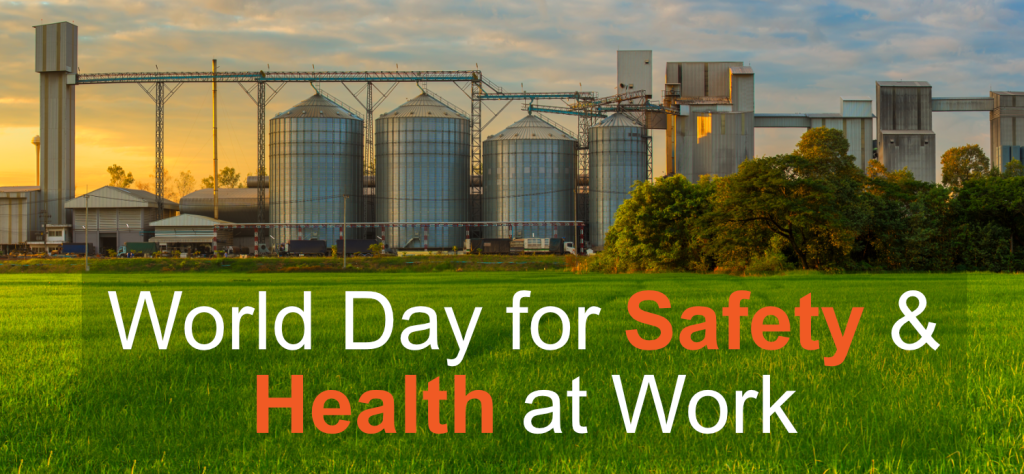We use cookies to make your experience better. To comply with the new e-Privacy directive, we need to ask for your consent to set the cookies. Learn more.
World Day for Safety and Health at Work
Protecting people and the environment.
World Day for Safety and Health at work is celebrated annually on 28th April. Focusing on promoting safe and healthy workplaces to protect employees and businesses. The campaign highlights the magnitude of the problem. It aims to raise awareness of how creating a health and safety culture in the workplace, can help reduce the number of work related deaths and injuries. Promoted worldwide by the International Labour Organization (ILO) this day encourages workers, employers and local authorities to work together to create safe and healthy working environments.Did you know every day 6,300 people die as a result of accidents or work-related deaths, around the world. That is to more than 2.3 million deaths a year*.
Are your health and safety measures up to date?
Businesses in the UK must comply with the Health and Safety legislation including the Health & Safety at Work Act 1974. A primary piece of legislation which sets out duties that employers have towards employees and member of the public. It also includes duties employees have to themselves and each other.Poor occupational health and safety practices lead to millions injuries worldwide each year. Resulting in extended to time off work, costing time and money.
All workers have a right to work safely, in places where risks to their health and safety are properly controlled. Risks should be identified and removed, where possible, to ensure everyone’s safety. Where a risk cannot be removed, steps to protect workers must be taken, such as Personal Protective Equipment (PPE).
Training must also be provided for employees to carry out their duties safely. Including fire drills, workstation assessments as well as understanding signage and hazardous symbols plus many more.
Ensuring you have adequate health and safety measures in place in your workplace can help you protect your workforce and avoid costly fines. The HSE website contains guidance for UK businesses to help.
Spillcraft can help you to protect your workforce
Ensuring you staff are trained in the areas required for their role is essential. Spill training is often an area which is overlooked. It is important to provide your employees the knowledge and understanding of how a spill can impact people and the environment. Giving them the confidence of how to react in an emergency to ensure health and safety is a priority. Something as simple as a spill which isn't contained or cleared quickly could cause a member of staff or customer, to slip or fall, or potentially risk the environment by entering a drain or soaking into the ground.Not having an effective spill management solution in place can have serious consequences, these include:
- Accidents and injuries to employees.
- Damage to equipment and property, leading to loss of production and increase costs.
- Irreversible damage to wildlife and environment if spills enter the soil or waterways.
- Reputation damage and negative publicity including brand damage.
- Company losses, stakeholder confidence, time and money.
- Loss of credibility with customers and suppliers.
- Increased insurance premiums.
Spill Management made simple.
Having the correct spill management, will keep your business compliant and your workforce and the environment safe.
Simple measures could include:- Ensuring the correct PPE is available and employees understand how to correctly utilise it.
- Making sure staff are aware of how to correctly don and doff coveralls.
- Spill site surveys to detail your ‘at risk’ areas.
- Ensuring you have the correct emergency spill kits, located in the right place.
- Ensuring you have correctly trained spill response staff.
- Understanding your drainage system, and how to reduce risks of pollution in an emergency
- Storing and transporting drums and liquid containers correctly, in line with legislation.
We all have a responsibility to keep our workforce protected with the correct health and safety.
Want to understand how we can assist and support you with your spill management procedures?
Contact us on T: 01606 352 679 or E: [email protected]
- Figures taken from Awareness days website.
You May Also be Interested In:
-

Site Survey
We assess your site, equipment, and spill training procedures, highlighting any potential danger zones that are apparent on site.
Read More -

Spill Training
Spill training courses designed to ensure your team are fully compliant and confident to prevent and deal with any spill incident.
Read More -

Managed Spill Service
A complete solution that we manage on your behalf, providing appropriate spill products with a regular audit and replenishment service
Read More -

Spill Equipment
Wide range of equipment to help prevent or respond to spills safely. Including safe storage, trollies, spill kits, PPE and much more
Read More


